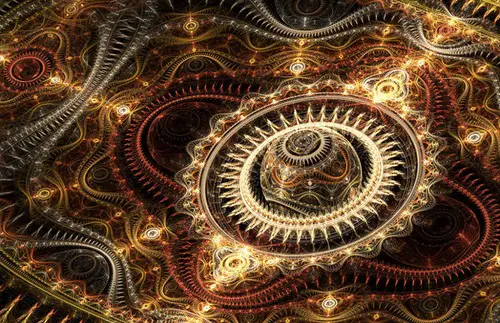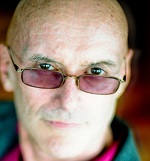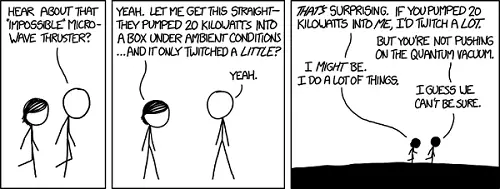TRANSLATE THIS ARTICLE
Integral World: Exploring Theories of Everything
An independent forum for a critical discussion of the integral philosophy of Ken Wilber
Jumping to Speculations
A Comment on Joe Corbetts
Essays on Trans-Darwinism
Frank Visser

What should be transcended is the view that according to science things happen purely because of chance.
Many attempts have been made to expand the neo-Darwinian worldview, even if conceding its basic tenet that natural selection plays a large role in evolution. It is crucially important to know thoroughly what is meant by "Darwinian" before any attempt to transcend it can be successful. Ken Wilber thinks neo-Darwinism is correct as far as it goes but is incomplete because it cannot explain evolutionary novelty. For that reason he has introduced the notion of an "Eros in the Kosmos", a quasi-physical/spiritual drive towards higher forms of complexity and consciousness.[1] Given his inadequate understanding of the scientific understanding of Darwinian evolution, his "alternative explanation" leaves much to be desired, especially when presented as a serious scientific proposition.[2]
Others have argued that Darwinian evolution cannot explain value and purpose in evolution, and needs to be complemented by some metaphysical principle. Steve McIntosh, for example, has suggested a strong pull behind evolution drawing every organism towards the True, the Beautiful and the Good.[3] Again, no scientist has yet felt the need to introduce such a speculative notion, nor can it be argued that it explains much. For sure, evolution has had its fair share of ugliness and injustice, given the fact that 99% of all species that ever lived have gone extinct—and we will positively help the remaining species to go down the same road. And again, Christian authors have felt that neo-Darwinian explanations fall short of handling "irreducible complexity", or they feel that the complexities of DNA force us to admit it must have been coded by a Divine Programmer.[4]
All these attempts need to clarify first that there is really such a need for expansion of the Darwinian model, that cannot be tackled by competing scientific paradigms within biology. Darwinism is certainly not uncontroversial among fellow-biologists, especially in its "fundamentalist" versions as headed by Richard Dawkins. More importantly, a scientific theory always needs to be explicit about what exactly it purports to explain. What specific empirical phenomena does the theory or model clarify? Furthermore, a scientist needs to be aware of any alternative scientific models that equally claim to be able to explain the same set of empirical facts. There is no 100% certainty to be had in scientific knowledge, all we can do is follow the consensus of "settled science", of the majority of qualified practitioners, while dissenting minority positions—which claim to be able to explain the same set of facts by different models—will always be there. Just promoting your own theory by adducing some facts that speak in its favor, while at the same time hiding those facts that speak against it, isn't seen as good scientific practice. It's nice to read about lofty theories that "explain" life, the cosmos and everything under the sun, but our first response should always be: what facts are you actually trying to explain?
To get a feel for the spirit of science, most paleontologists agree that birds descended from a type of dinosaurs called theropods. But when exactly this happened and what exactly makes a bird or a dinosaur is open to debate. In fact, we might say there never was a first bird because "dinosaur" and "bird" are abstract concepts we arbitrarily impose on a continuity of successive generations. When does a dinosaur turn into a bird? When it has feathers? When it can fly? There have been bird-like dinosaurs, and early birds with dinosaur-like feet. But never did a dinosaur-mother give birth to a bird-child. But by reconstructing these evolutionary sequences we can say that "birds descended from dinosaurs".
Or to give another example: in the standard model of physics an electron is a mass-less particle with negative charge, which plays a hugely important role in the build-up of atoms, biological metabolic processes, and the modern world. We don't know what an electron really is—if there really is a "really", in these cases—but that doesn't prevent us from creating a splendid world of electronics, from the light bulb to the iPhone. The model itself is workable and will be replaced with a better one when that comes along, but that doesn't hinder any practical applications. So we have at the same time both the building of tentative models and theories and a close attention to empirical detail and processes, which together constitute a scientific explanation.
beyond the mechanistic explanations of blind chance?
Joe Corbett, a valued contributor to Integral World for his continuous hammering on the point of social justice and the perceived lack of engagement by Integral Theory of exactly that field, has submitted two essays that argue for a "trans-Darwinian" perspective, worldview even, one more evocative[5] and another more discursive[6]. In these recent essays, he has argued that Darwinism needs to be expanded to include such varied fields as quantum physics, morphogenetic fields, the holographic paradigm with its Bohmian holomovement and even archetypal astrology. One wonders in earnest: what empirical phenomena are supposed to be explainable using this heterogeneous string of disciplines?
In particular, he points to the so-called "quantum-vacuum" which he feels might play a possible role in storing information about biological complexity.
For those not aware of these fields or research in quantum physics,
In quantum field theory, the quantum vacuum state (also called the quantum vacuum or vacuum state) is the quantum state with the lowest possible energy. Generally, it contains no physical particles. Zero-point field is sometimes used as a synonym for the vacuum state of an individual quantized field.
According to present-day understanding of what is called the vacuum state or the quantum vacuum, it is "by no means a simple empty space". According to quantum mechanics, the vacuum state is not truly empty but instead contains fleeting electromagnetic waves and particles that pop into and out of existence.[7]
This refers to a hugely complex field of physics, heavy with mathematical formulations, but like more New Age (or New Science, depending on where you stand) authors, Corbett links it to a cosmic form of consciousness, that informs and stores information about all manifest forms, not unlike Sheldrake's morphogenetic theory.
In his second essay, Corbett opens with: "Trans-Darwinism accepts the premises of Darwinism but goes beyond the mechanistic explanations of blind chance to explain not just the evolution of biological life-forms but the universe as a whole." What is suspicious in this opening statement is the playing of the chance-card, which has a long history in anti-Darwinian circles.
Integral philosopher Ken Wilber is, of course, a prime example of this line of thought. He famously stated in his best-selling A Brief History of Everything (1996):
 Ken Wilber
Ken Wilber
Calculations done by scientists from Fred Hoyle to F.B. Salisbury consistently show that twelve billion years isn't enough to produce even a single enzyme by chance.
In other words, something other than chance is pushing the universe. For traditional scientists, chance was their god. Chance would explain it all. Chance—plus unending time—would produce the universe. But they don't have unending time, and so their god fails them miserably. That god is dead. Something other than chance is pushing the universe… Chance is not what explains the universe; in fact, chance is what that universe is laboring mightily to overcome. Chance is exactly what the self-transcending drive of the Kosmos overcomes.[8]
Curiously, Ken Wilber is on the same page here with the notorious Turkish creationist Adnan Oktar, aka Harun Yahya, author of the freely distributed and fully illustrated tome The Atlas of Creation:
 Adnan Oktar
Adnan Oktar
According to Darwinists, all the wondrous variety of life on Earth came into being “BY CHANCE.” In order to avoid saying that “Allah created them” (surely Allah is beyond that), Darwinists have adopted chance as a god, in their own eyes, and claimed that blind, unconscious events represent the sole origin of these glorious and wonderfully complex living systems… Chance is the false god of Darwinism, that supposedly created everything and even works miracles. According to the shallow Darwinist world view, time and chance are, in some fantastical way, capable of bringing everything into being.
Darwinists who seek to account for the origin of life in evolutionary terms using utterly illogical scenarios ARE IN FACT UNABLE TO EXPLAIN HOW EVEN A SINGLE PROTEIN COULD COME INTO BEING SPONTANEOUSLY. That is the first and most important fact that should be known about Darwinist frauds.[9]
Strange bedfellows, perhaps, but then again, perhaps not, as allies against Darwinism. Wilber has often said he agrees with creationists as to their critiques of neo-Darwinism, but not as to their alternatives (Jehova, Allah). But does his Eros-in-the-Kosmos-theory actually fare any better?
These sweeping statements obscure the basic fact that chance is never the sole explanation in evolutionary theory or cosmology. Richard Dawkins has been very adamant on this point. He writes: "It is grindingly, creakingly, obvious that, if Darwinism were really a theory of chance, it couldn't work."[10] Instead, he argues that random variation (mostly based on chance) AND non-random selection together are responsible for the complexities of nature.
So the strategy of these spiritualists is often to
- present a straw-man version of the scientific view,
- profess to accept that view as far as it goes and
- present some exotic supplementary knowledge to complete our understanding of nature.
This strategy fails badly when the first step is a mis-step, that is, when science can explain much more than the spiritualist claims it can.
REVERSAL OF THE BURDEN OF PROOF
Says Corbett at the end of his first trans-Darwinian essay:
In the new paradigm of Trans-Darwinian evolution, biological evolution is seen as coming out of the matrix of a complexly entangled space that we may variously call the implicate order, the hologram holomovement, or the Akashic field, and until Neo-Darwinian theory can account for this and how it influences evolution, it is an incomplete theory, and cries out for supplemental explanation.
This is a strange reversal of the burden of proof, a mixup of hypothesis and fact. For the burden of proof is not on Darwinism to account for how the implicate order or the hologram holomovement or the Akashic field supposedly generate biological complexity. The burden of proof is on those, including Corbett, who claim that introducing these concepts throws any light at all on this field of science.
How could this possibly work? Has some attempt been made anywhere in the literature to specify in detail how this process operates? Even the hypothesis of morphogenetic fields, which stands closest to the biological phenomena in question, has trouble specifying how these supposed fields contain information about the formation of biological organs such as feet, wings and eyes.[11] The metaphor of radio waves breaks down here because it is us who code information into these waves at the radio station, whereas it is unclear how this information could possibly be present in these morphogenetic fields. Not to mention the fact that these fields supposedly only account for the repeated appearance of existing forms, but can't account for any novelty in evolution, for which even Sheldrake resorts to a transcendental explanation.[12]
So the real thing that should be transcended is the view that according to science things happen purely because of chance. That is a favorite tenet of spiritualists. In 1888 Madame Blavatsky, the Grand Dame of the Western esoteric tradition, wrote in the Preface of her The Secret Doctrine: "The aim of [this] work is to show that nature is not 'a fortuitous concurrence of atoms' and to assign to man his rightful place in the scheme of the Universe."[13]. Again, this overlooks that, whatever the role of chance in cosmological and biological evolution—and it is a huge one (for we wouldn't be here without the meteorite that wiped out the dinosaurs)—there's always a second mechanism at work in scientific models: chance and lawfulness or chance and determinism or chance and selection, where the second mechanism has a decidedly non-random effect. Instead of prematurely declaring current science to be inadequate for explaining biological complexity, it would be best to take a closer look at this very science itself.
Corbett adds a cautionary footnote at the end of his second essay, to warn against reifying evocative concepts such as Eros, Agape or Spirit, which have been introduced by Ken Wilber to "explain" evolution, so as not to mistake them for real explanations.
It is important from a trans-Darwinian perspective that terms like Eros, Agape, and Spirit only be used as heuristics, and not as substitutes for understanding the complex material processes underlying them that they are intended to signify. There is a tendency for such terms to become fetishized idols that operate as god-like substitutes for real and empirically explainable material realities.
That is a step in the right direction. I would add a second cautionary note: to not prematurely introduce avant-garde fields of science (such as quantum physics) as explanatory principles without explicitly documenting how these concepts might throw any light on the empirical realities we try to understand. How exactly do the Ground of the Kosmos (Corbett: "perhaps the most important concept in trans-Darwinism"), the implicate order, the quantum vacuum, the Akashic field, the Great Unconscious, the Kosmic Mind (or, to include Wilber in this parade of unorthodox explanations: "the storehouse consciousness of the casual realm, as per the Lankavatara Sutra") with their supposed informational fields actually do their work?
Note the casualness, and even carelessness (for is he really interested in the nitty-gritty scientific details?) of Wilber when he discusses Sheldrake's theories in his latest book The Religion of Tomorrow (2017), where he argues that science has been "so very bad at explaining the form, pattern, or structure of manifest things"[14], but spirituality could provide these missing explanations:
Where is that "form" stored?… Well, we might say it is stored in the storehouse consciousness of the causal realm, as per the Lankavatara Sutra (or perhaps in what some Eastern traditions call "the Akashic record"). But wherever it is stored, it is clearly stored somewhere in the real Kosmos, and it clearly has a real causative impact on the sensorimotor world….[15]
Here again, fact and hypothesis are mixed up, for that such a cosmic storehouse consciousness "clearly has a real causative impact [italics his] on the sensorimotor world" is something to be demonstrated first, instead of claimed up front, before any scientist can take these things seriously. Is there a shred of evidence that the quantum vacuum, so Corbett, "is an expanding reservoir of energy that records everything that has ever happened and ever will happen in the universe", to the effect that it is instrumental in bringing about biological complexity? Likewise Ken Wilber claims that this storehouse-consciousness is "the repository of all past forms anywhere in the universe". Does that statement even begins to make sense when we ask for specifics, for concrete examples from the field of scientific research? Does this vacuum store how to make a bird's wing, or a mammal's eye, or a viable immune system? And is it effective also on the multitude of planets, even within our own solar system, that clearly show no signs of life?
To my knowledge, such a theoretical explanation hasn't even been tried by those who promote New Science in any of its forms from a spiritual perspective. The over-confidence of these claims and statements stands in direct proportion to their credibility and usefulness in the arena of science. Science in turn, painstakingly reconstructs cosmological and biological evolution by proposing verifiable mechanisms that stay close to empirical reality. For the moment, this is still the way to go.

NOTES
[1] Frank Visser, "Eros in the Kosmos", www.integralworld.net
[2] Frank Visser, "The 'Spirit of Evolution' Reconsidered", www.integralword.net
[3] Frank Visser, "Platonic Evolution", www.integralworld.net
[4] Frank Visser, "Our DNA As Proof for God's Existence?" www.integralworld.net
[5] Joe Corbett, "Trans-Darwinian Evolution", www.integralworld.net
[6] Joe Corbett, "A Trans-Darwinian Worldview", www.integralworld.net
[7] Wikipedia, "Vacuum State".
[8] Ken Wilber, A Brief History of Everything, Shambhala, 1995, p. 26
[9] "Evolutionist's False God is Chance", evolutioninternational.net
[10 ] Richard Dawkins, Climbing Mount Improbable, Penguin, 1996, p. 67-8.
[11] Frank Visser, "Rupert Sheldrake and the Evo-Devo Revolution" and Rupert Sheldrake, "Morphogenetic Fields: A Reply to Frank Visser", www.integralworld.net
[12] Rupert Sheldrake, A New Science of Life, Park Street Press/Inner Traditions, 1981, p. 14: "The hypothesis is concerned with the repetition of forms and patterns of organization; the question of the origin of these forms and patterns lies outside its scope. (p. 13-14) and "The origin of new forms could be ascribed either to the creative activity of an agency pervading and transcending nature; or to a creative impetus immanent in nature; or to blind and purposeless chance." (p. 150)
[13] H.P. Blavatsky, The Secret Doctrine, 1888, Volume I, p. viii.
[14] Ken Wilber, The Religion of Tomorrow, Shambhala, 2017, p.600.
[15] Ken Wilber, The Religion of Tomorrow, Shambhala, 2017, p.645.
|

 Frank Visser, graduated as a psychologist of culture and religion, founded IntegralWorld in 1997. He worked as production manager for various publishing houses and as service manager for various internet companies and lives in Amsterdam. Books: Ken Wilber: Thought as Passion (SUNY, 2003), and The Corona Conspiracy: Combatting Disinformation about the Coronavirus (Kindle, 2020).
Frank Visser, graduated as a psychologist of culture and religion, founded IntegralWorld in 1997. He worked as production manager for various publishing houses and as service manager for various internet companies and lives in Amsterdam. Books: Ken Wilber: Thought as Passion (SUNY, 2003), and The Corona Conspiracy: Combatting Disinformation about the Coronavirus (Kindle, 2020). 


